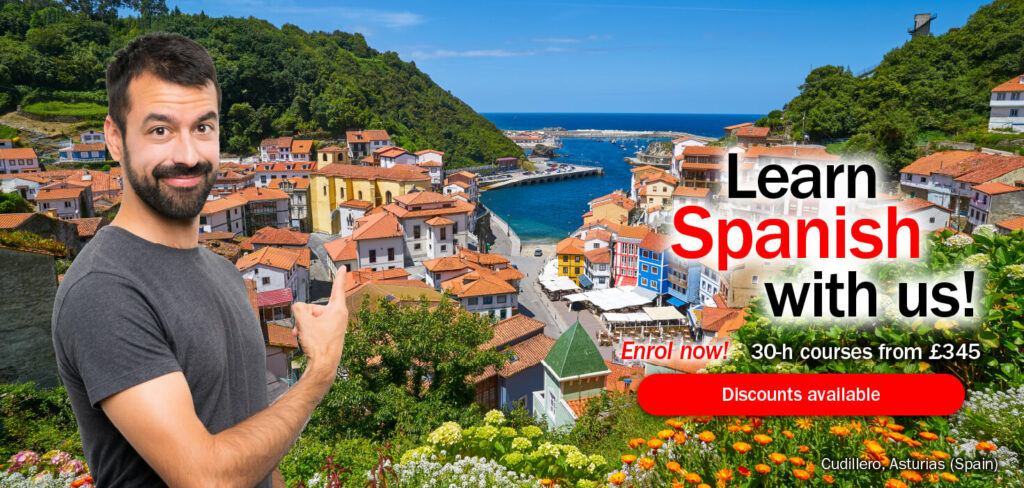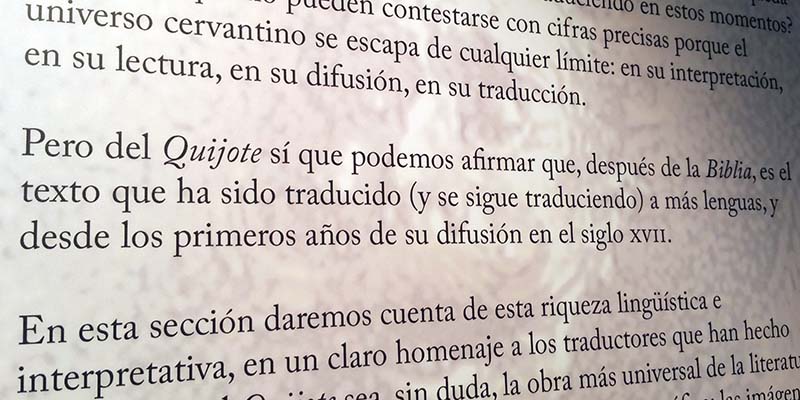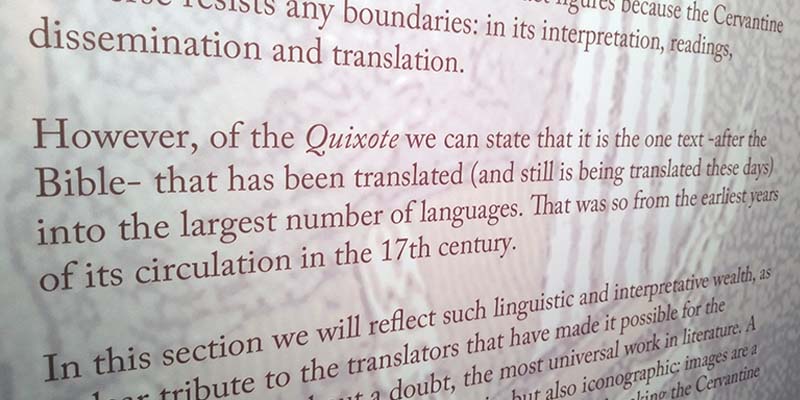New Spanish courses starting in January
¿Por qué aprender español? Hablada por casi 600 millones de personas, el español es la lengua oficial en 21 países. España es uno de los destinos vacacionales más populares para los británicos y el conocimiento del español puede mejorar los ingresos entre un 30 % y un 50 %. ¡Aprende español con nosotros!
Why learn Spanish? Spoken by almost 600 million people, Spanish is the official language in 21 countries. Spain is one of the most popular holiday destinations for the Brits and knowledge of Spanish can improve earnings by between 30% and 50%. Learn Spanish with us!
Season’s Greetings And Happy New Year!

¡Felices Fiestas y próspero Año Nuevo!
Our e-library is open 24/7
Dive into the world of endless possibilities!
Whether you’re a night owl or an early bird, our eLibrary is here for you 24/7!
Immerse yourself in captivating stories, explore new worlds, and feed your mind with knowledge anytime, anywhere!
Rincón bibliográfico de noviembre: Neruda
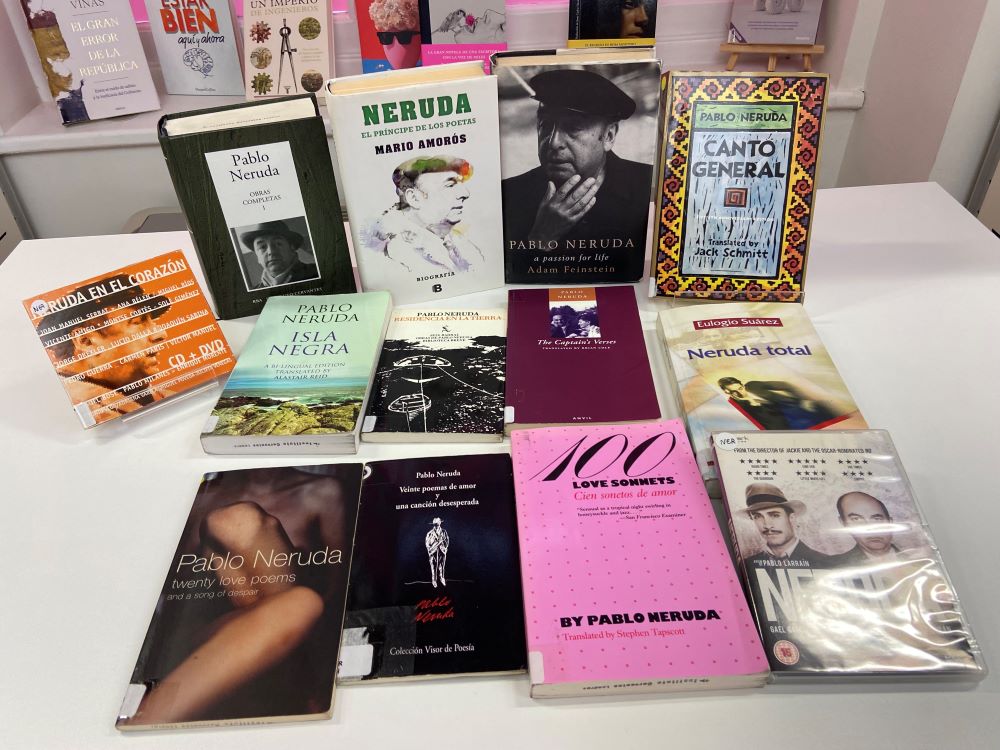
Conmemoramos los 50 años de la muerte del poeta chileno Pablo Neruda, Premio Nobel de Literatura en 1954 con una selección de libros y otros materiales que se encuentran en nuestra biblioteca escritos por él y sobre él.
Full Programme London Spanish Book & Zine Fair
| The Fifth edition of the London Spanish Book & Zine Fair will take place on Saturday 7th and Sunday 8th October 2023. Way Home is the theme of the book and zine fair and we hope you can be part of it! With a lineup that includes acclaimed writers Cecilia Szperling (Argentina), Andrea Jeftanovic (Chile), Lucía Asué Mbomío Rubio (Spain) and Ángela Nzambi (Equatorial Guinea), among others, the Way Home edition promises many surprises and encounters: Theatre in Translation with Out of the Wings; Queer poets: Love in a new age; Writers in no man’s land; Paste Up activities with London International Paste Up Festival; LO(R)CA me tienes with Ana Gomila Domènech and so much more. Full Programme More than 40 exhibitors will be present at this year’s edition. The fair will take place over two full days and the programme will include talks, exhibitors stalls, creative writing, poetry and zine workshops, an outdoor paste up activity, storytelling for children and a Poetry Open Mic. Bilingual activities (English/Spanish). Indoor Cafe and so much more!Meet publishers, writers, translators, fanzine makers, illustrators and open minded readers interested in the Spanish language. The London Spanish Book & Zine Fair is free to attend but you need to register beforehand on Eventbrite.Workshops are free and paid and you need to additionally register for each one (Book your Workshop). Places are limited. |

Fifth Edition of the London SpanishBook & Zine Fair
Saturday 7th and Sunday 8th October 2023
The Crypt at St Peter’s
Liverpool Grove
London SE17 2HH (see map)
Note: The venue has disabled access
OPENING TIMES
Saturday 7th October 2023: 11 am to 5 pm
Sunday 8th October 2023: 12.30 pm to 5 pm
Organized by La Tundra Revista since 2019.
We would like to thank to our funders, sponsors, friends and collaborators for making this edition of the book and zine fair possible: Arts Council England, Instituto Cervantes London, Argentine Embassy in London, Victorina Press, Mexican Cultural Centre, London International Paste Up Festival and Arts House Project London.
Rincón bibliográfico de julio
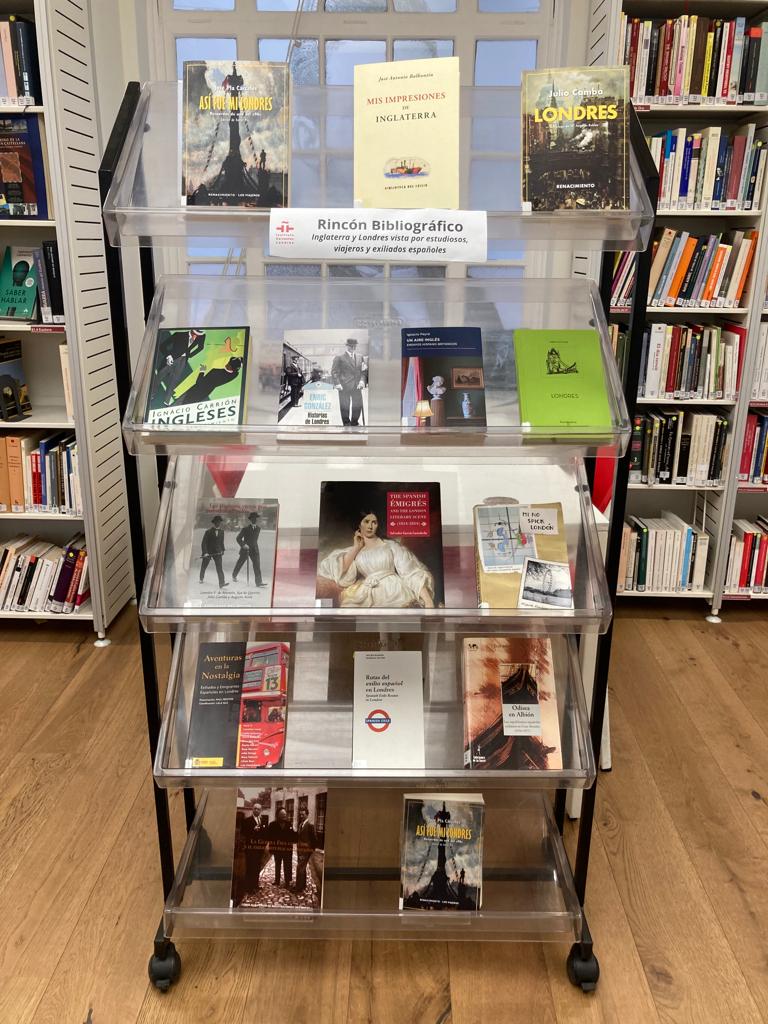
London and England as seen by Spanish scholars, travellers and exiles
We invite you to join us on a bibliographic tour with various Spanish scholars, travellers, experts, novelists and politicians, who, for different reasons, have lived in London and other parts of England. Discover the ways in which their impressions and experiences made their way into their works.
Inglaterra y Londres vista por estudiosos, viajeros y exiliados españoles
Os proponemos un paseo bibliográfico con distintos estudiosos, viajeros, eruditos, novelistas y políticos españoles que por distintas circunstancias han vivido en en la ciudad del Támesis y en otras partes de Inglaterra y que plasmaron sus impresiones y sus vivencias de una u otra forma en sus obras.
Rincón bibliográfico abril 2023- Federico García Lorca
Federico García Lorca es el poeta español más más conocido y estudiado en el Reino Unido y, en general, en el mundo anglosajón. Por tal motivo, la biblioteca del Instituto Cervantes de Londres posee más de doscientos materiales sobre él o escritos por él. Para el rincón bibliográfico de este mes hemos realizado una selección de libros y otros materiales, fundamentalmente en inglés sobre su vida y su obra.
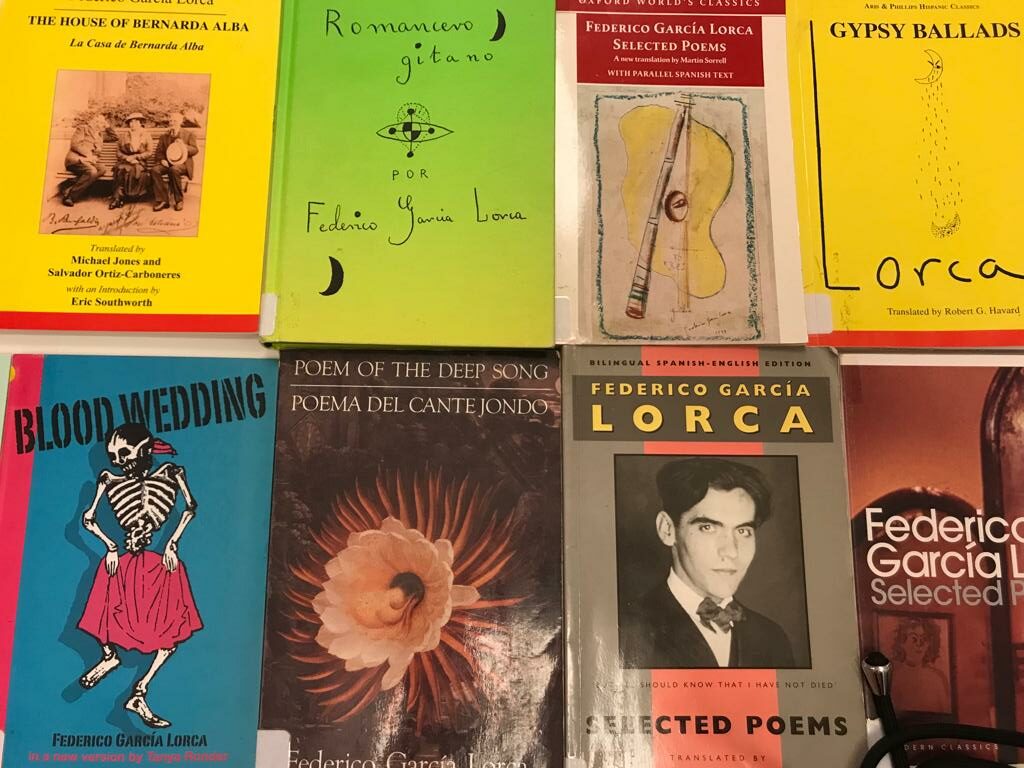
Interest in Instituto Cervantes Teaching Accreditation Diploma (DADIC) continues to grow given increasing demand for learning Spanish in the United Kingdom
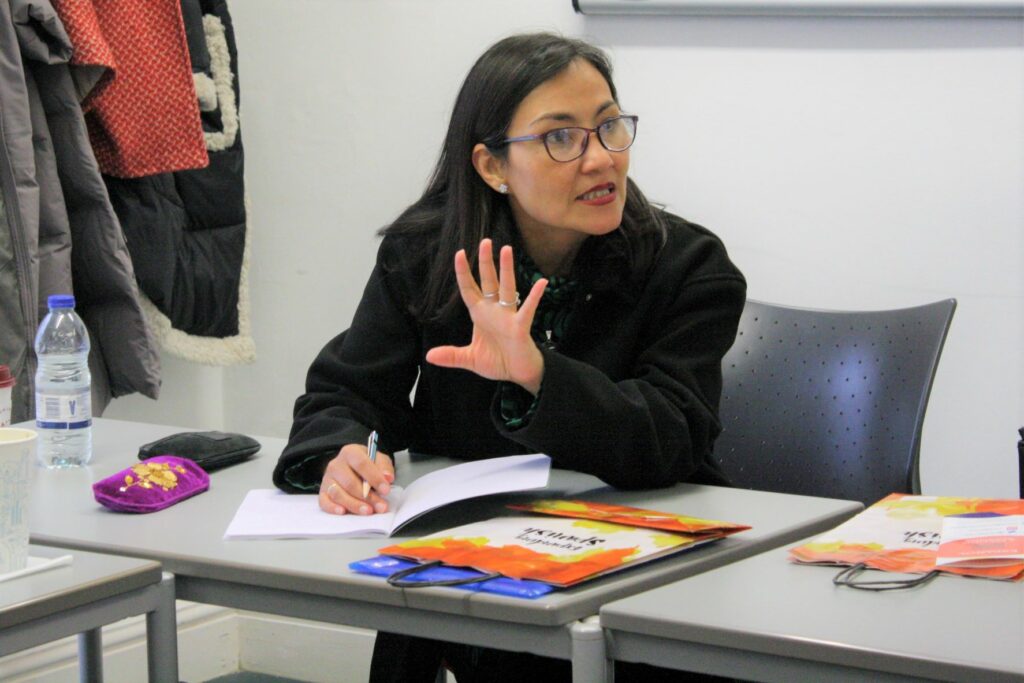
Instituto Cervantes London is training future teachers of Spanish as a foreign language through its preparation course for the Instituto Cervantes Teaching Accreditation Diploma (DADIC-A, autonomous level) within the context of an increasing demand for learning Spanish in the United Kingdom. A new group of students is about to complete the second module during the course’s fourth edition.
“The preparation course for the DADIC- A enables participants to teach Spanish communicatively, efficiently and professionally”, says Antonio Vañó Aymat, head of studies at Instituto Cervantes London. “Training new Spanish teachers in the United Kingdom is important to us. Spanish is one of the most studied languages in the country, and the demand for experienced qualified teachers of this language continues to grow”, adds Vañó Aymat.
“Training new teachers allows Instituto Cervantes to play a part in how Spanish is taught in the UK. We ensure high-quality teaching through a unique student-centred, action-oriented methodology. It combines theory and practice and is based on action, interaction and reflection to broaden future teachers’ skills and equip them with the tools needed to analyse and develop their professional practices”, the head of studies explains.
The course is aimed at those with no previous experience or training in teaching Spanish as a foreign language. A pleasantly surprising aspect of the fourth edition is participants’ level of education. They hold degrees in various fields: some have completed diplomas, Master’s degrees and PhDs in Education, Communications and Hispanic Studies, while others come from what are usually considered unrelated backgrounds such as engineering and business management.
“The level of education held shows that the high-quality professional training offered by Instituto Cervantes London attracts exceptional students seeking to improve their skills in teaching Spanish as a foreign language”, emphasises Vañó Aymat. Moreover, participants’ great interest and will to learn reflects “their commitment to teaching the language”. Students are from all over the Spanish-speaking world, which enriches and diversifies their learning experience.
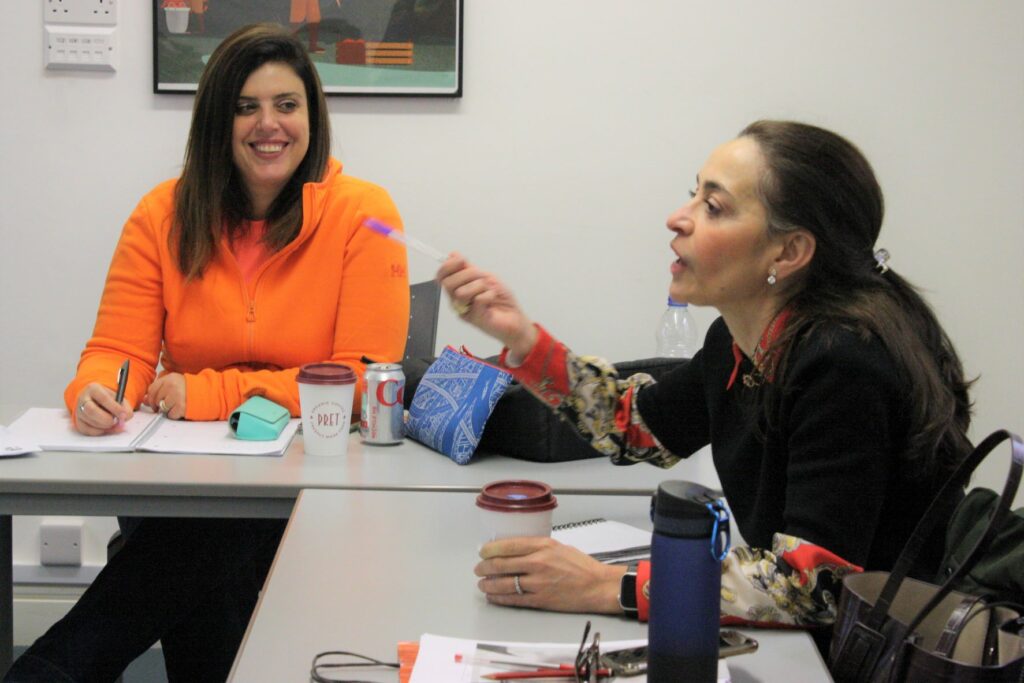
Increasing demand for learning Spanish in the United Kingdom
Venezuelan student Gitanjali Wolfermann, who has been living in London for just over five years, says, “I was pleasantly surprised by the increasing demand for learning Spanish in the UK, and especially by the desire to learn about Latin American culture. Here in London, I am far from home, but not my culture, which is inherently linked to my mother tongue, the language I think and feel in.”
In Wolfermann’s case, sharing her love for her language and culture is what inspired her to teach Spanish. “I chose the course because of its extensive curriculum and highly qualified, experienced teachers. I was also drawn to the combination of theory and practice”, she said.
Wolfermann also highlights that she and her fellow participants have been exposed to various levels, from beginners’ through to advanced. “This is not available everywhere, as a lot of the courses are online”, she notes. Another factor that persuaded her was the qualification achieved, which is certified by Instituto Cervantes.
“Many people think that being a native speaker of a language automatically means you can teach it. This is far from true. A teacher needs many tools and techniques to help students progress. It is no good teaching them isolated grammar rules or making them repeat meaningless phrases; it helps to build connections to better their understanding of the language and its rich culture”, Wolfermann highlights.
A very valuable experience
Jesica Paz, who is from Chile, wishes to become a Spanish teacher to work with students from diverse backgrounds, cultures and age groups. She wants to share her language and culture with them while also learning about theirs. She says, “I wanted to take the course to acquire new teaching tools and models that will help me improve the planning, development and analysis of the classes I give.”
In Paz’s view, taking the preparation course for the DADIC-A has been a “very valuable experience on both a personal and professional level”, as she has learnt new things that leave her better prepared for the future inside and outside of the classroom.
Paz highlighted that what she liked most about the course is that it has given her “new tools that will lead to greater professional development”, and she is certain that the qualification will open doors to the possibility of teaching Spanish anywhere in the world.
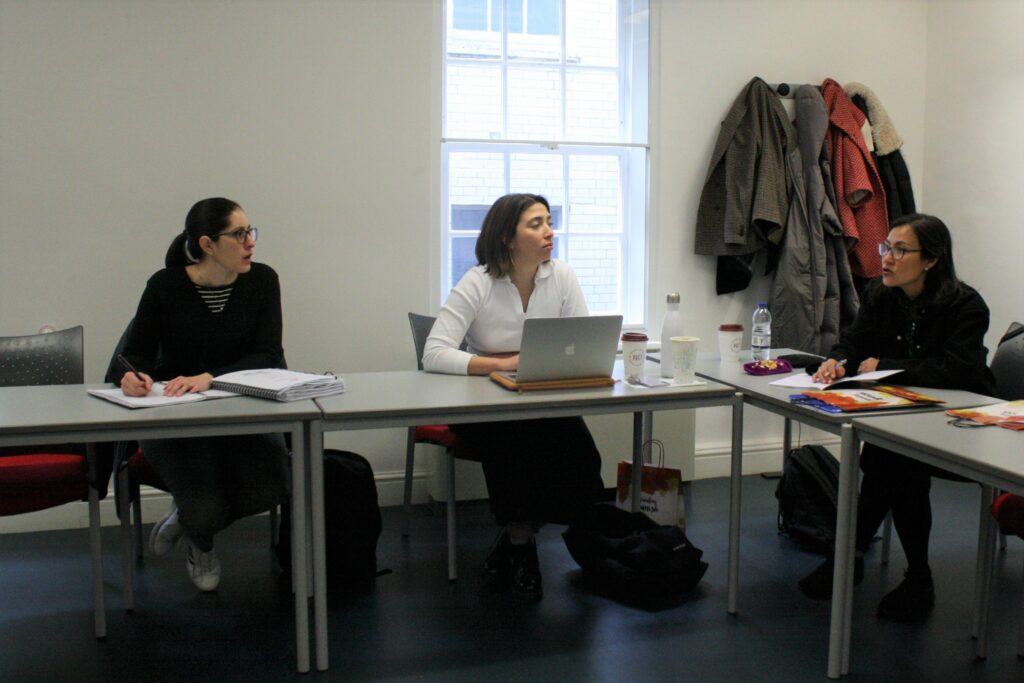
Taking the DADIC was the best decision
Student Milagrosa Villalobos, who is from Seville and has been living in London since 2011, began her journey as a Spanish teacher during the pandemic, when native speakers were needed to help Spanish A Level students prepare for their exams.
“After a few years helping young people learn and improve their Spanish, I decided it was time to formally train. Taking the DADIC was the best decision I could have made. The excellent course instructors have guided me in the right direction on my journey as a Spanish teacher”, explains Villalobos, adding that the course was “great from the start, in relation to both the learning experience and the instructors leading the course”.
A practical course to help develop teaching skills
Instituto Cervantes London has been offering this introductory course in teaching Spanish to adults since October 2019. It is aimed at those with no previous experience or training, and is divided into two modules, which focus on the early development of teaching skills and preparing for the DADIC-A.
Upon completion, teachers no longer require supervision. They are able to make decisions independently in relation to managing the language teaching, learning and assessment process.
Equally, they are well prepared to apply techniques and models learnt during the course and take risks with new approaches in the classroom. They are also able to adapt their teaching style to other contexts and will be able to critically review and improve their performance.
More information about the Preparation course for the DADIC-A
«Quijotes por el mundo», el alcance del Quijote de Cervantes / Don Quixotes Around The World, The Scope Of Cervantes’s Masterpiece
En el marco del IV centenario de la muerte del autor hispano más universal, Miguel de Cervantes, en el Instituto Cervantes de Londres hemos inaugurado «Quijotes por el mundo» (exposición comisionada por el catedrático y cervantista José Manuel Lucía Megías), un reconocimiento del alcance de la obra de Cervantes y, a su vez, un tributo a los muchísimos traductores que, desde el sXVII y hasta la actualidad, han invertido su tiempo en hacerla crecer hasta convertirla en un fenómeno cultural global. Mientras estás leyendo estas líneas, alguien en alguna parte del mundo está traduciendo un fragmento de la obra más conocida de Cervantes.
Tras años de investigación y recopilación documental, se ha podido constatar que «El ingenioso hidalgo Don Quijote de la Mancha» de Miguel de Cervantes existe en 172 variedades lingüísticas de 147 lenguas: esta cifra la convierte oficialmente en la obra más traducida del mundo después de la Biblia.
Durante la investigación, se ha observado también que cada traducción e ilustración a lo largo de la historia ha adaptado el personaje del Quijote, su vocabulario, aspecto e indumentaria, al contexto histórico y social del entorno en que se hablaba dicha lengua, hasta hacer universales los valores y lecciones impartidas -y aprendidas- por el particular caballero. En 1863, fue Gustave Doré quien unificara la imagen y figura de Don Quijote, ilustrando y dando así vida al flaco hidalgo y su rechoncho escudero Sancho Panza que conocemos en la actualidad.
Niños, jóvenes y adultos de todo el mundo, durante 400 años, han transcrito, traducido, ilustrado e interpretado en pantalla al Quijote. Ven a ver una muestra de algunas de esas interpretaciones, leer el Quijote en braille y escuchar lecturas de fragmentos de «El ingenioso hidalgo Don Quijote de la Mancha» en otros idiomas: la entrada es libre y la exposición estará abierta en nuestro auditorio hasta el 10 de junio 2016.
Así es «Quijotes por el mundo»:
_____________________________________________________________________________
_____________________________________________________________________________
_____________________________________________________________________________
To mark the IV centenary of the passing of the most universal Hispanic author, Miguel de Cervantes, at the Instituto Cervantes in London we launched the exhibition Don Quixotes Around The World (commissioned by prof. Jose Manuel Lucia Megias, lecturer and Cervantes specialist), with the aim of illustrating the span of Miguel de Cervantes’s most renowned work and paying homage to all those translators involved in its growth over time. As you read these lines, someone, somewhere in the world is working on a translation of an excerpt of Cervantes’s stellar piece of writing.
After a lengthy focus on the compilation of worldwide takes on this book, it has been ascertained that The Ingenious Gentleman Don Quixote Of La Mancha by Miguel de Cervantes has been translated to 172 dialectal varieties of 147 different languages, thus officially becoming the second most translated book in the world after the Bible.
Research also showed that past translations and illustrations of Don Quixote had adapted its main characters’ clothes, vocabulary and overall looks to the historical and social context of the region where the target language was spoken at the time. The hundreds of translators and illustrators of Cervantes’s work throughout history have helped make Don Quixote’s values and lessons universal. It was Gustave Doré who unified the aspect of the book’s characters in 1863, thus creating the slim gentleman Don Quixote and his chubby squire Sancho Panza, nowadays adopted worldwide.
For 400 years, children, teenagers and adults the world over have transcribed, translated, drawn and played Don Quixote on screen. Come watch samples of some of those interpretations, read don Quixote in braille and hear excerpts of The Ingenious Gentleman Don Quixote Of La Mancha read in other languages: admission is free and the exhibition is open at our centre until 10 June 2016.
Here is what you will find at Don Quixotes Around The World (introduction in Spanish):
